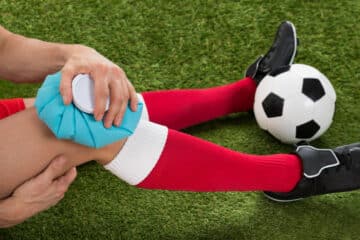
I’ve spoken to horribly disabled old football players who told me they’d do it all again, whatever life’s sacrifice, just to have played the game. How many players have taken performance-enhancing drugs without any concern about the possible side effects? So many athletes will do almost anything to compete.
But now, in an ironic twist, some surgeons have come to feel terribly conflicted about their part in salvaging an athlete’s career.
via For Young Athletes, Knee Surgery Opens Door To Pain : NPR.
The excerpt above is from a recent article published in the NPR. In my opinion the author did not present the topic — or the issues fairly or in sufficient enough detail. As always there are two sides to every story.
First; the title. “Knee SURGERY Opens the Door to Pain”. Is that true? Perhaps. However, simply tearing your ACL— without having surgery to reconstruct it can also lead to osteoarthritis. Why? We’re not exactly sure. It may have to do with the different forces the cartilage and bone *see* after the tear. It may have to do with the loss of nerve fibers which were in the ACL. It may have to do with the concomitant injuries to the cartilage and menisci — I wish we knew more.
Second; if the surgery was properly indicated then the patient had instability of the knee — which means that their leg was buckling, unstable and giving way throughout the day or with certain sports. Therefore, some people simply do not have much of a choice when it comes to an ACL reconstruction. IF their knee is unstable with activities of daily living then they run the risk of falling simply by walking to the bathroom.
Those athletes who choose to have surgery to allow themselves to return to sports is another issue altogether. They have a difficult decision. Would they rather give up the sport (and still run the risk of developing osteoarthritis), or have the surgery and continue playing the activities they love… and the activities that determine whether or not they are satisfied with their quality of life. For children or young adults this is a very very difficult discussion to have. In their minds they usually perceive of themselves as being indestructible. They’ve heard the word arthritis but have no idea what it means or what it means to live with it. BUT … again… the risk of developing osteoarthritis begins the moment the ACL tore, and if you throw a meniscus tear on top of it, then the risk of developing osteoarthritis, even WITHOUT surgery is very high.
Lastly, there are no well performed research studies to prove that returning to sports after ACL surgery makes the arthritis worse than it would have been without returning to sports.
We have a long way to go before we are able to intervene or halt the natural history of a lot of Orthopedic and other medical disorders. Doctors can only treat diabetes, heart disease, hypertension… and ACL tears… we can not as yet cure many diseases or alter their natural history… perhaps we can slow their progression… but sometimes that’s the best we can do (for now).
Do you have questions regarding an Orthopedic injury or longevity?
Do you want to talk to an expert who can listen to you for 45-60 minutes and explain the options in detail?
Dr. Howard Luks offers remote guidance sessions to review your X-ray or MRI images and explain your options.
Dr. Luks has also received hundreds of requests for educational sessions on the topics discussed in his book, Longevity Simplified.
Presenting the story fairly and accurately would also have been the best thing to do… for now.












Nick Dawson
As a two time ACL repair patient, I’m more concerned than I am knowledgeable. Dr. Luks, I appreciate your review of the issue and concerns, knowns and unknowns. In my case, quality of life meant making a conscious decision to continue to be active and play the sports I like. I’ll candidly say that I believe there will be continued advancements in joint replacement and arthritis treatments; I’m optimistic when (if?) I become symptomatic there will be new or improved treatment options. In other words, I felt like I made a sound decision on repair and returning to active life, even in that means replacement or other treatment in the future.
Thanks Nick… always great to hear feedback from someone who’s *been* there.